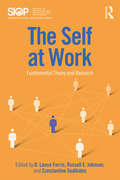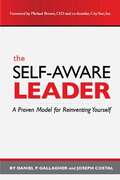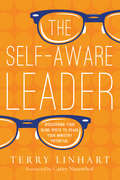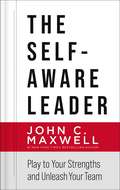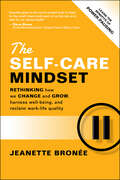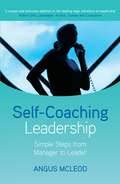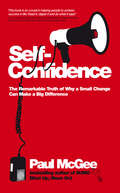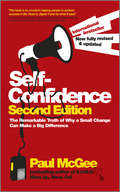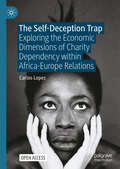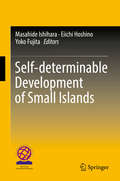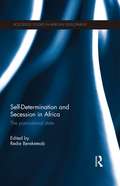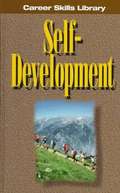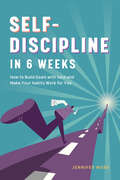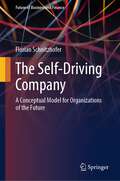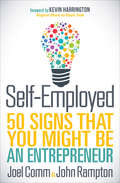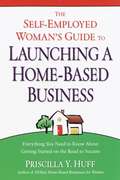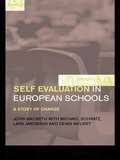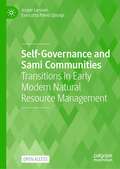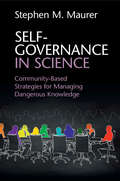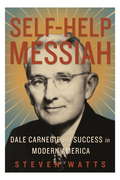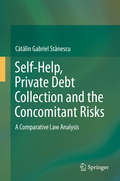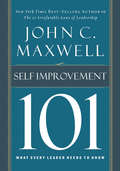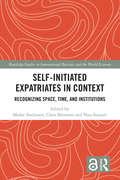- Table View
- List View
The Self at Work: Fundamental Theory and Research (SIOP Organizational Frontiers Series)
by D. Lance Ferris Russell E. Johnson Constantine SedikidesThe Self at Work brings researchers in industrial and organizational psychology and organizational behavior together with researchers in social and personality psychology to explore how the self impacts the workplace. Covering topics such as self-efficacy, self-esteem, self-control, power, and identification, each chapter examines how research on the self informs and furthers understanding of organizational topics such as employee engagement, feedback-seeking, and leadership. With their combined expertise, the chapter authors consider how research on the self has influenced management research and practice (and vice-versa), limitations of applying social psychology research in the organizational realm, and future directions for organizational research on the self. This book is a valuable resource for researchers, graduate students, and professionals who are interested in how research on the self can inform industrial/organizational psychology.
The Self-aware Leader: A Proven Model For Reinventing Yourself
by Daniel P. Gallagher Joseph CostalThe Self-Aware Leader provides practical and proven lessons on how becoming more self-aware within the context of your management practices will benefit you, your career, and your organization. Based on research by the author, it offers insights regarding those aspects of your management career about which you need to become self-aware, and which characteristics drive desirable leadership outcomes such as achieving success with projects, promotions, and professional satisfaction. Some of the specific topics discussed in The Self-Aware Leader include: defining the advantages of self-awareness in leadership specific lessons on how to become a self-aware leader guidance on how to successfully reinvent self, others, and the business applying your self-awareness to the task of day-to-day management the importance and value of profitable imagination in leadership how thinking like a general manager can yield benefits to you and your organization the power of Generosity QuotientTM and professional authenticity as leadership practices how to put these lessons together by “connecting the dots” to boost innovation and success. The Self-Aware Leader delivers a proven program to increased success for both you and your organization by outlining a path to greater managerial self-awareness. With its specific, experience-based insights for managers, The Self-Aware Leader is an extremely valuable resource for anyone interested in increasing their leadership skill set and furthering their managerial career.
The Self-Aware Leader: Discovering Your Blind Spots to Reach Your Ministry Potential
by Terry Linhart2018 Top Ten Books For Parish Ministry Effective ministry begins here. You've studied what you think you need to know before entering a career in ministry. Is there anything that is more important than knowing about hermeneutics, homiletics, theology, exegesis, and everything else you have likely learned in seminary and church ministry so far? Yes, there is. How well do you know yourself? You need to build your ministry career on the right foundation of an objective understanding of self. If you don't comprehend your strengths and weaknesses, then you won't be fully prepared to enter the crucible of ministry. Serving as a pastor is one of the toughest calls there is. But it can also be one of the most fulfilling and rewarding, especially if you have taken the time to examine both your gifts and vulnerabilities. The church needs leaders who have the clear-eyed courage to pursue the hardest part of the ministry journey: seeing yourself. The Self-Aware Leader will help you to do just that.
The Self-Aware Leader: Play to Your Strengths, Unleash Your Team
by John C. MaxwellWhat&’s the single greatest obstacle leaders face in their development, effectiveness, and advancement? Lack of self-awareness! Dr. John C. Maxwell's The Self-Aware Leader will help any leader become more self-aware, focused, and confident. In this short yet insightful volume, you will learn how to:gauge your effectiveness as a leader,make better choices that lead to success,discover and correct your own mistakes,improve your leadership with the team, andmake the right trades in your career.With fifty years of leading and teaching experience, Maxwell, the most influential leadership expert in the world, can help you become your best leadership self. The Self-Aware Leader is great for:men and women of all ages.new and seasoned leaders who want to avoid micro-managing, handle criticism with grace, and give others the credit they deserve.new and seasoned managers looking to identify their strengths, become a better learner, and improve listening skills.When leaders don&’t see themselves clearly, understand their strengths and weaknesses, or recognize their negative interactions with their team, they limit their influence and undermine their own effectiveness. What&’s the solution? Become a self-aware leader.
The Self-Care Mindset: Rethinking How We Change and Grow, Harness Well-Being, and Reclaim Work-Life Quality
by Jeanette BroneeThis is a generous and profound book, a book worth sharing. It will stick with you for years to come.”—Seth Godin, Author, The Practice “Jeanette gives us the much-needed tools to listen for the small clues inside each of us that ask us to care for our mental health.” —Steve Burns, Emmy-Nominated Actor, Original Host of Blue’s Clues The world has changed, our lives have changed, and in recent years, our work has changed. Despite the disruption, our relationship and understanding of self-care have remained the same as we still see it as something fluffy or a perfect list of habits that we "do" alone outside of work to recover. But what if self-care wasn't something we "do"? What if self-care is a mindset that allows us to achieve peak performance, engagement, and growth without burning out and sacrificing our health and joy? In The Self-Care Mindset, celebrated well-being and mindset expert Jeanette Bronée delivers an actionable and groundbreaking approach that challenges us to rethink self-care at work so we no longer have to choose between being healthy and being successful. With Jeanette’s inclusive approach to self-care, you will receive the tools to protect and unlock our most important resource: our humanity. You'll learn how to better manage stress, break free from living in survival mode, and navigate FUD (fear, uncertainty, and doubt) so you can harness change and grow by reclaiming agency and recovering what you care about. You'll also: Discover proven frameworks and useful tools, like "Power Pausing," the "C.A.R.E. Framework," and "AAA" Find ways to move beyond the outdated concept of "work-life balance" to one of "work-life quality" Learn to build an ecosystem of relationships with yourself, with others, and with work itself. Inclusion. Well-being. Care. This is the future of work. A future where well-being is the foundation for peak performance, engagement, and a culture where people belong and work better together by cultivating connection, communication, and collaboration. A can't-miss resource for busy professionals and business leaders everywhere, The Self-Care Mindset will find its way into the hands of managers, executives, board members, and anyone else who struggles to be busy and find fulfillment and happiness in their working lives at the same time. This is a generous and profound book, a book worth sharing. It will stick with you for years to come.”—Seth Godin, Author, The Practice “Jeanette gives us the much-needed tools to listen for the small clues inside each of us that ask us to care for our mental health.” —Steve Burns, Emmy-Nominated Actor, Original Host of Blue’s Clues
Self-Coaching Leadership
by Angus I. McleodGenerally, leadership is about influencing people to make big things happen. Management is a process of organizing people to get things done. They are different skills, but equally critical to success in today's workplace. The key is to know which approach works best in which situation.Written in a clear, simple style, Self-Coaching Leadership redefines and demystifies the journey to leadership. Angus McLeod's no-nonsense thinking, straightforward approach and practical tools enable readers to more easily identify when a leader is needed - and coach themselves toward improved influence, performance and effectiveness.
Self-Confidence: The Remarkable Truth of Why a Small Change Can Make a Big Difference
by Paul McGeeA bestselling motivational author on life's X factor: confidence. Have you ever wondered how different your life would be if you increased your confidence by just 10%? Paul McGee has. And in his latest book, he explains what confidence is, where it comes from, why it's important, and how to develop it in yourself and others. Not only does the book deal with confidence in business, romance, social situations, and all areas of life, it explodes common myths, including why 'over-confidence' and 'under-confidence' are both harmful. Loaded with practical tips on bouncing back from a setback and feeling confident in challenging situations, this inspiring, upbeat book will help fill you with life's X factor. Full of practical tips on feeling confident during job interviews, presentations, networking, and social gatherings Written by Paul McGee, bestselling author of S.U.M.O. (Shut Up, Move On) and S.U.M.O. Your Relationships With this indispensable guide, you'll not only learn how to feel confident, but turn confidence into meaningful life-changing action.
Self-Confidence
by Paul McgeeThe new edition of the personal development classicThis long-awaited second edition gives us even more of Paul McGee's unique look at boosting our confidence - with his much-loved wit and good humour. The new edition includes a brand new chapter and a host of new exercises.Paul's approach to confidence is different. According to Paul, we don't have to raise our self-confidence to the roof; just increasing our confidence by a small amount can dramatically change our lives. Paul explains exactly what confidence is, why it's so important and just how to develop it in ourselves and others. This honest, practical and realistic book covers:Confidence in business Being more confident in your love life Confidence in social situations Confidence in job interviews and presentations A brand new chapter on handling conflict confidently Experiences from real people who have followed Paul's advice and improved their lives
The Self-Deception Trap: Exploring the Economic Dimensions of Charity Dependency within Africa-Europe Relations
by Carlos LopesThis book examines the economic relationship between Africa and Europe. It highlights the stigmatized narratives about Africa and analyses how they influence a range of key actors and processes. This is illustrated by the actions of European actors who reinforce negative narratives through replacing real economic transformation and development with charity, while African leaders compete to maximize aid donations and help further these narratives. This book acknowledges the complex history of the relations between Africa and Europe and details the ways in which Africa has become a peripheral player in the world economy. It will be relevant to researchers and policymakers interested in development and African economics. This is an open access book.
Self-determinable Development of Small Islands
by Masahide Ishihara Eiichi Hoshino Yoko FujitaThis book aims to clarify the present situation of the relations between small island countries and territories on the one hand and the great powers, mainland areas, and mega-islands on the other, and explores how small island countries and territories preserve and build their identity under globalization. This book is divided into five parts. The first part presents papers on issues that are related to Okinawa: the American military presence, the formation of a global human network, and the history of and language revitalization in Okinawa. The second part includes papers on security in East Asia and the Pacific Region: the history of and present issues in international relations within the South and East China Sea areas. The third part presents papers on economic issues and social developments on small islands. The fourth part deals with ocean policies and marine resource management in the Pacific Region by the United States, Australia, and Japan. Finally, the fifth part presents papers on the revitalization of three indigenous languages. All the chapters of the book are based on the achievements of the research project "Towards New Island Studies: The Ryukyus as an academic node between East Asia and Oceania" conducted by the International Institute for Okinawan Studies at the University of the Ryukyus. This 5-year project was funded by the Japanese Ministry of Education, Culture, Sports, Science and Technology and aimed to contribute academically to the creation of sustainable and self-determinable societies in small island regions. This work will be extremely useful and informative for readers in small island countries and territories and for researchers who are interested in small island issues to understand the current situation and who wish to consider effectual and feasible solutions.
Self-Determination and Secession in Africa: The Post-Colonial State (Routledge Studies in African Development)
by Redie BereketeabThis book provides a unique comparative study of the major secessionist and self-determination movements in post-colonial Africa, examining theory, international law, charters of the United Nations, and the Organisation of African Unity (OAU)/African Union’s (AU) stance on the issue. The book explores whether self-determination and secessionism lead to peace, stability, development and democratisation in conflict-ridden societies, particularly looking at the outcomes in Eritrea and South Sudan. The book covers all the major attempts at self-determination and secession on the continent, extensively analysing the geo-political, economic, security and ideological factors that determine the outcome of the quest for self-determination and secession. It reveals the lack of inherent clarity in international law, social science theories, OAU/AU Charter, UN Charters and international conventions concerning the topic. This is a major contribution to the field and highly relevant for researchers and postgraduate students in African Studies, Development Studies, African Politics and History, and Anthropology.
Self-Development Skills
by Dandi Daley MackallThe Career Skills Library describes the skills, traits, and attributes that are crucial to success in any field. This series details the competencies identified by the Department of Labor's SCANS (Secretary's Commission on Achieving Necessary Skills) as essential to solid job performance. Each book focuses on one of these skills in the workplace and shows how students can improve that skill while still in school. Self-Development -- Examine traits like dependability, integrity, and honesty that will help you succeed in all areas of your life.
Self-Diagnosis: Do You Have the Right Stuff to Start a Business?
by Richard LueckeIdeas are an important element of success for entrepreneurs, but they're not as important as personal background, motivation, and attitude. In discussing the traits that research has defined as essential to success and the tests that are available for judging suitability, this chapter helps you determine whether you have the makings of a business entrepreneur.
Self Discipline in 6 Weeks: How to Build Goals with Soul and Make Your Habits Work for You
by Jennifer WebbFrom chasing dreams to catching them—how self discipline with heart can help you set goals and reach them What stands between you and your aspirations in life? Whether it's self-doubt, indecision, or a to-do list a mile long, you're not alone. Self Discipline in 6 Weeks is your guide to breaking through the seemingly complex barriers that have stopped you—until now. While self discipline can sound daunting, this book breaks it down into easy, actionable sections aimed at helping you achieve a little bit more every day for six weeks. Research-backed insights from positive psychology and neuroscience, plus sage advice from mindfulness practice, provide the surprisingly powerful foundation of purpose, self-esteem, and resilience required to turn dreams into reality. Inside Self Discipline in 6 Weeks you'll learn about: Knowing yourself—Self-inquiry exercises help you determine what's truly important to you—and how to prioritize it. Self-care—Learn how self-compassion can help you manage stress or setbacks on your way to living with meaning and authenticity. Skill builders—Six skill-building chapters help you hone your ability to succeed, including understanding your true values, finding purpose, setting meaningful goals, and learning how to bounce back from anything. Be your own best personal coach and harness the power of self discipline to achieve your goals.
The Self-Driving Company: A Conceptual Model for Organizations of the Future (Future of Business and Finance)
by Florian Schnitzhofer"The Self-Driving Company" offers strategic insights to management professionals seeking to navigate the evolving business landscape. This visionary book presents a comprehensive vision of the autonomous enterprise, encompassing key elements such as autonomy, sustainability, humanity, and resilience. Delving into the year 2035 and beyond, it charts a clear path toward the self-driving company and its transformative potential. From understanding the levels of autonomy to exploring the power of software, algorithms, and artificial intelligence, this book equips leaders with the knowledge to shape their organizations for success. Gain practical guidance on overcoming challenges, embracing digitization, and revolutionizing value creation. Discover new forms of organization that transcend hierarchies and learn how automation can optimize interactions with customers, partners, and suppliers. "The Self-Driving Company" also examines the crucial role of humans in this automated ecosystem. With thought-provoking theses and real-world examples, it offers valuable insights into leadership, management, and the evolving roles of knowledge workers, employees, and auxiliary staff. As the future of management unfolds, this book serves as a compass, enabling strategic decision-making and positioning businesses to thrive in an era defined by automation and human potential.
Self-Employed: 50 Signs That You Might Be an Entrepreneur
by Joel Comm John RamptonTwo successful entrepreneurs offer a no-nonsense guide to the qualities that make people suited to starting their own businesses. In today&’s world of startup companies, entrepreneurs are disrupting industries and fueling the economy like never before. It&’s an exciting life where no day is quite like the next. But along with the adventure comes a lot of uncertainty, and not everyone is suited to the entrepreneurial life. So, what does it take? In Self Employed, Joel Comm and John Rampton detail 50 different qualities found in people who could do well as entrepreneurs. Having started, managed, and sold several multimillion-dollar businesses, Comm and Rampton understand what it takes to succeed in this highly competitive realm. The 50 qualities they outline provide a framework for anyone to decide if they might make it in business on their own. If you&’re wondering whether the entrepreneurial lifestyle is right for you, or you want to know for sure that the business you&’ve already started is suited to your temperament, this book is for you!
The Self-Employed Woman's Guide to Launching a Home-Based Business: Everything You Need to Know About Getting Started on the Road to Success
by Priscilla HuffStep-by-Step Advice on Making Your Home-Business Dreams a RealityFrom Priscilla Y. Huff, the leading expert on home businesses for women, The Self-Employed Woman's Guide to Launching a Home-Based Business is your step-by-step resource to getting the business of your dreams up and started in no time. Packed with expert advice and nitty-gritty details about what it takes to run a successful home-based business, this book will show you how to: ·Prepare--physically and mentally--for a new career from home ·Balance work and family time for maximum enjoyment--and minimum stress ·Find and fill out the proper tax, license, and insurance forms ·Handle customers and bring in new business ·Implement creative and effective marketing plans ·Manage your finances and accounting with ease ·And much, much more! Filled with valuable resources and profiles of successful home-based entrepreneurs, this book answers all your questions about starting an enjoyable and profitable venture.From the Trade Paperback edition.
Self-Empowerment und Professionalisierung in Migrantinnenselbstorganisationen: Eine biografieanalytische und differenzreflektierende Untersuchung (Pädagogische Professionalität und Migrationsdiskurse)
by Iva HradskáDas Forschungsinteresse dieser Studie richtet sich auf das Zusammenspiel von Biografie und Professionalisierungsprozessen von Akteurinnen in Migrantinnenselbstorganisationen (MSO) bei der Ausübung ihrer Bildungs- und Beratungsarbeit. Es werden drei Fallanalysen mit markanten Innenansichten präsentiert. Als Ergebnis werden drei Muster vorgestellt, die auf unterschiedliche Herstellungsprozesse biografischer Passungsverhältnisse individueller undorganisationaler Professionalisierung und Self-Empowermentstrategien der Akteurinnen verweisen. Die Muster zeigen, dass die Akteurinnen eine bestehende dynamische Wechselbeziehung zwischen der ausgeübten Tätigkeit und den Interaktionsressourcen aus ihren Migrationsbiografien zu nutzen und individuelle Lösungs- und Bewältigungsstrategien bei der Professionalisierung und Etablierung der MSO anzuwenden vermögen. Die priorisierten Zielverständnisse ihrer Tätigkeit unterscheiden sich entlang der drei ausgearbeiteten Muster: die Möglichkeiten die gesellschaftliche Partizipation von Migrantinnen zu erhöhen, Selbstverwirklichung der Migrantinnen zu unterstützen und migrations- und geschlechtsbezogene Exklusionsprozesse zu minimieren.
Self-Evaluation in European Schools: A Story of Change
by Lars Jakobsen John MacBeath Denis Meuret Michael SchratzIn a political and economic climate in which school performance is made public, performance tables and inspectors' reports can only tell a partial story.This is a unique book. It tells the story of one school seen through the eyes of a pupil, a parent, a teacher, a headteacher and a critical friend. The story is a compelling journey through the process of school improvement; theories of school effectiveness and school improvement are progressively clarified.This book is based on a well-known and well-documented research project that represents eighteen European countries, which clearly sets it in a European Policy context. It includes a wealth of practical tools for raising standards for teachers and school managers to refer to, and guidance on how to use them.This eagerly awaited follow-up to Schools Must Speak for Themselves by John MacBeath (RoutledgeFalmer 1999) is a vital and useful source of good ideas, challenging insights and practical strategies for real schools.
Self-Governance and Sami Communities: Transitions in Early Modern Natural Resource Management
by Jesper Larsson Eva-Lotta Päiviö SjaunjaThis open access book uses an interdisciplinary approach that not only focuses on social organization but also analyzes how societies and ecological settings were interwoven. How did early modern indigenous Sami inhabitants in interior northwest Fennoscandia build institutions for governance of natural resources? The book answers this question by exploring how they made decisions regarding natural resource management, mainly with regard to wild game, fish, and grazing land and illuminate how Sami users, in a changing economy, altered the long-term rules for use of land and water in a self-governance context. The early modern period was a transforming phase of property rights due to fundamental changes in Sami economy: from an economy based on fishing and hunting to an economy where reindeer pastoralism became the main occupation for many Sami. The book gives a new portrayal of how proficiently and systematically indigenous inhabitants organized and governed natural assets and how capable they were in building highly functioning institutions for governance.
Self-Governance in Science: Community-Based Strategies for Managing Dangerous Knowledge
by Stephen M. MaurerCommercial and academic communities use private rules to regulate everything from labor conditions to biological weapons. This self-governance is vital in the twenty-first century, where private science and technology networks cross so many borders that traditional regulation and treaty solutions are often impractical. Self-Governance in Science analyzes the history of private regulation, identifies the specific market factors that make private standards stable and enforceable, explains what governments can do to encourage responsible self-regulation, and asks when private power might be legitimate. Unlike previous books which stress sociology or political science perspectives, Maurer emphasizes the economic roots of private power to deliver a coherent and comprehensive account of recent scholarship. Individual chapters present a detailed history of past self-government initiatives, describe the economics and politics of private power, and extract detailed lessons for law, legitimacy theory, and public policy.
Self-help Messiah
by Steven WattsAn illuminating biography of the man who taught Americans "how to win friends and influence people" Before Stephen Covey, Oprah Winfrey, and Malcolm Gladwell there was Dale Carnegie. His book, How to Win Friends and Influence People, became a best seller worldwide, and Life magazine named him one of "the most important Americans of the twentieth century." This is the first full-scale biography of this influential figure. Dale Carnegie was born in rural Missouri, his father a poor farmer, his mother a successful preacher. To make ends meet he tried his hand at various sales jobs, and his failure to convince his customers to buy what he had to offer eventually became the fuel behind his future glory. Carnegie quickly figured out that something was amiss in American education and in the ways businesspeople related to each other. What he discovered was as simple as it was profound: Understanding people's needs and desires is paramount in any successful enterprise. Carnegie conceived his book to help people learn to relate to one another and enrich their lives through effective communication. His success was extraordinary, so hungry was 1920s America for a little psychological insight that was easy to apply to everyday affairs. Self-help Messiah tells the story of Carnegie's personal journey and how it gave rise to the movement of self-help and personal reinvention.
Self-Help, Private Debt Collection and the Concomitant Risks
by Cӑtӑlin Gabriel StӑnescuThe book shows that self-help in commercial law is a fast, inexpensive and efficient alternative to court enforcement. Self-help remedies and private debt collection are largely but not exclusively features of common law jurisdictions, since remnants of private enforcement can still be found in contract law in civilian systems. The book argues that - despite their usefulness - self-help and private debt collection entail significant risks, especially for consumer debtors. This means that private enforcement needs to be accompanied by the introduction of tailor-made consumer-debtor protection regulation. Specific attention is given to factoring, which functions in many instances as a form of pseudo-private debt collection and which has been exploited to bypass sector-specific consumer protection regulations.
Self-Improvement 101: What Every Leader Needs to Know
by John MaxwellTo improve your life, improve yourself.New York Times best-selling author John C. Maxwell asserts, "Most people don't realize that successful and unsuccessful people do not differ substantially in their abilities. They vary in their desire to reach their potential. The way they reach that potential is through commitment to personal growth." Self-Improvement 101 provides the essentials leaders need to keep striving for excellence no matter where they are or what they are doing. Some lessons you will learn from Dr. Maxwell's decades of experience:The secret of becoming a lifelong learnerWhere to focus your time for maximum growthWhat sacrifices are worth making to keep getting betterHow to overcome obstacles to self-improvementThe key to turning experience into wisdomLeaders are learners.People never reach their potential by accident.
Self-Initiated Expatriates in Context: Recognizing Space, Time, and Institutions (Routledge Studies in International Business and the World Economy)
by Maike Andresen; Chris Brewster; Vesa SuutariThis edited volume builds on the previously published Self-Initiated Expatriation: Individual, Organizational, and National Perspectives, which served to give in-depth insights into the concept and the processes of self-initiated expatriation and presented different groups undertaking self-initiated foreign career moves. While more than a hundred articles on self-initiated expatriation (SIE) have been published in the meanwhile, an examination of the research questions and samples of SIEs in published SIE research shows that the role of context and its impact on SIEs’ career-related decisions and behaviors has not been explored sufficiently. This raises the question in how far existing research results are comparable. The aim of this follow-up volume is to deepen the understanding of SIEs’ careers, focusing on the contextual influences of space, time, and institutions on the heterogeneous SIE population. More specifically, the editors aim to shed light on spatial conditions in terms of the home and host country conditions on the self-initiated expatriation experience and examine developments over time in terms of temporality of conditions and SIEs’ life-course. Moreover, the influence of the institutional context in terms of occupational, organisational, and societal specificities will be analysed. All chapters are based on strong theoretical foundations that serve to conceptualise "context" and are written by both established and emerging global academics and researchers. Self-Initiated Expatriates in Context contributes to conceptual clarity in the burgeoning field of SIE research by drawing attention to the importance of exploring context and, thus, boundary conditions to careers. It offers specific guidance for an improvement of future SIE-related research in order to enhance the validity of future empirical studies as well as for an improvement of managerial practice. It will be of interest to researchers, academics, practitioners, and students in the fields of international business, human resource management, organisational studies, and strategic management.
